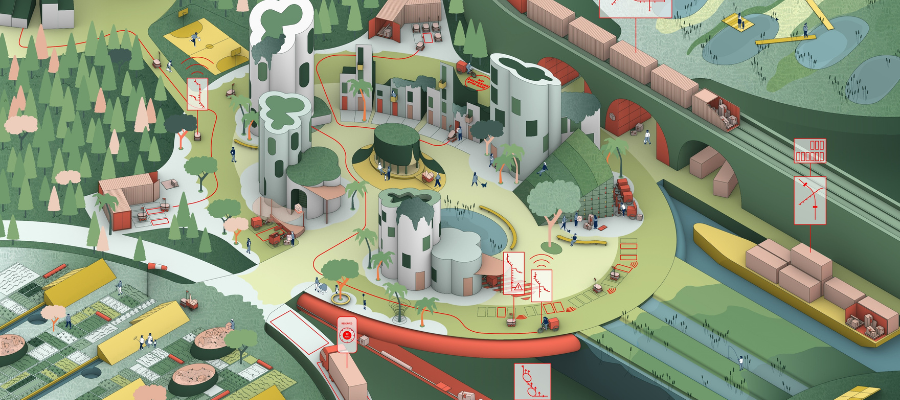🕒 Article read time: 2 minutes
The future of urban logistics and decarbonisation
Content sponsored by Arup

One of the most significant changes in the urban landscape of recent years has been the boom in urban logistics.
Roads in our cities, around warehouses, major arteries and residential streets are now heavily trafficked with arrays of HGVs, delivery vans and cars, scooters, bicycles, and other vehicles constantly moving goods or food around. This use of the urban space would have been almost unimaginable 20 years ago.
URBAN INFRASTRUCTURE IS CHANGING
This industry, largely driven by the growth of the entertainment sector and e-commerce, has transformed how, when and by whom roads, pavements and transport infrastructure are used. This change has in many ways been positive, but it has also led to a range of undesirable side effects.
REPORT CAPTURES TRENDS IMPACTING URBAN LOGISTICS
Arup has published a report – Future of Urban Logistics – which is intended to help delivery companies, urban planners, cities, and the wider supply chain understand the trends that are influencing urban logistics, along with the problems they are causing. The report also investigates some of the potential future directions for urban logistics which could help make the industry more sustainable, efficient, and conducive to liveable and healthy cities.
IDENTIFYING NEW WAYS TO SERVICE CITIES
The report advocates for the logistics industry to find new ways of delivering goods that don’t impinge on the health, social and environmental needs of urban citizens. The industry cannot be expected to do this without a clear and transparent regulatory framework. National governments and city leaders play a pivotal role here, as they can set targets, provide incentives, and manage firms that do not behave responsibly.
FIVE WAYS TO DECARBONISE LOGISTICS
There are several ways to decarbonise the logistics sector. Arup suggests that these are based around five main categories including:
- managing consumption, not only the consumption of goods through circular supply chains, re-use, etc, but also the use of logistics services, through routing efficiencies for example;
- technical innovation, such as drones, pipelines, electric and hydrogen vehicles;
- process and system improvements, particularly through the consolidation of space use and drop off locations;
- better Infrastructure for city logistics centres, bike logistics hubs, dark kitchens; and
- policy, at the moment driven by local policy and ambitious objectives to achieve net zero much faster than government plans.
NEW THINKING NEEDED TO SHAPE PUBLIC REALM
Master planners and urban designers should change and adapt to new ways of forming our public realm. The desire to utilise new technology or consolidate everything needs to be balanced with construction, carbon, and operational costs. Innovation and automation must be encouraged whilst retaining great placemaking and connectivity.
COLLABORATION KEY TO MANAGING URBAN SPACE
By working together and collaborating across supply chains, all stakeholders can foster a vibrant economy while also ensuring that the urban space is well managed and accessible to all.
The report covers urban logistics, including last-mile delivery, against a backdrop of the COVID-19 pandemic and a worsening climate crisis. We have looked at the UK specifically, although many of the insights and solutions explored here are relevant to many other regions.
You can view the Arup report by visiting the link below.
*www.arup.com/perspectives/publications/research/section/future-of-urban-logistics
Published On: 24/11/2022 16:00:34

Comments Section
If you are a Logistics UK member login to add comments.